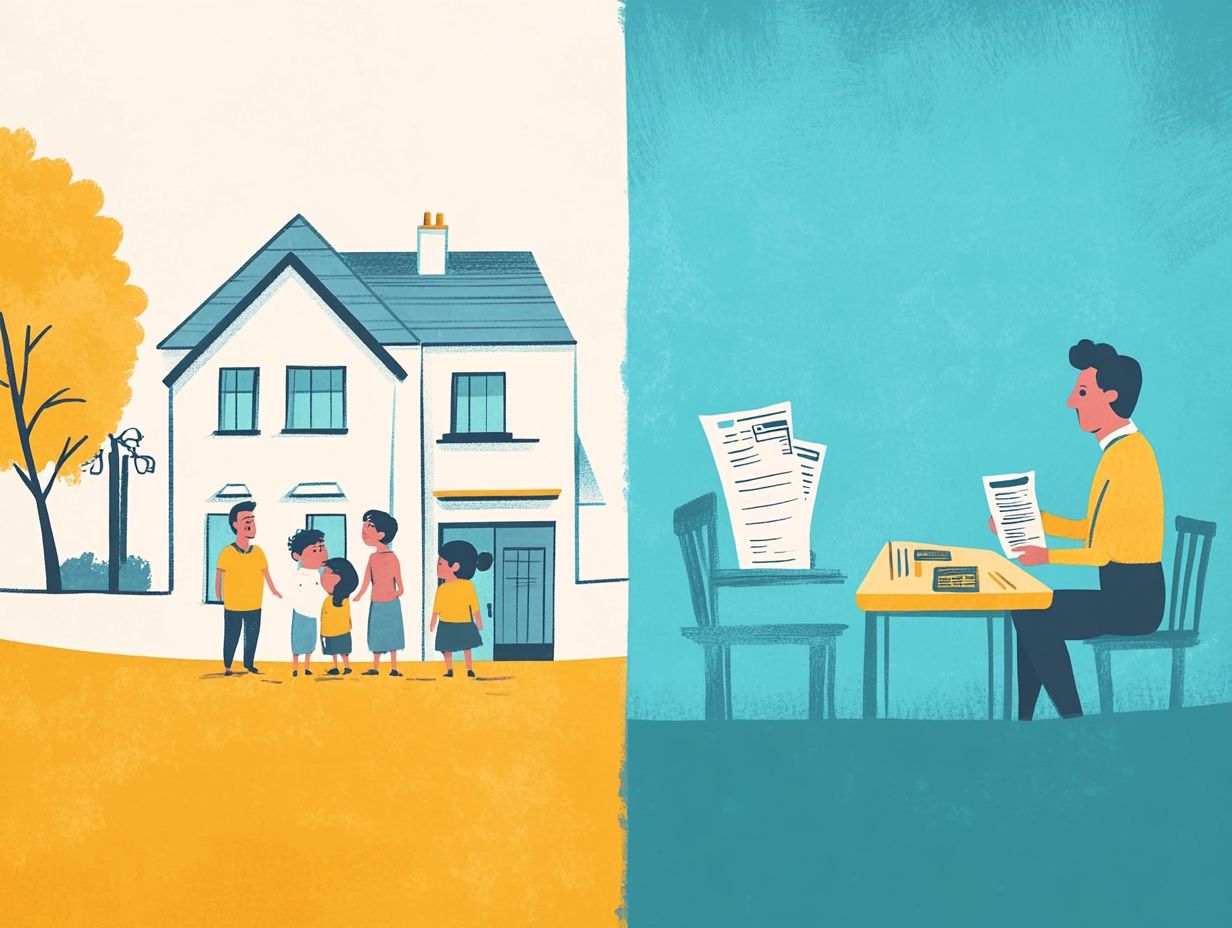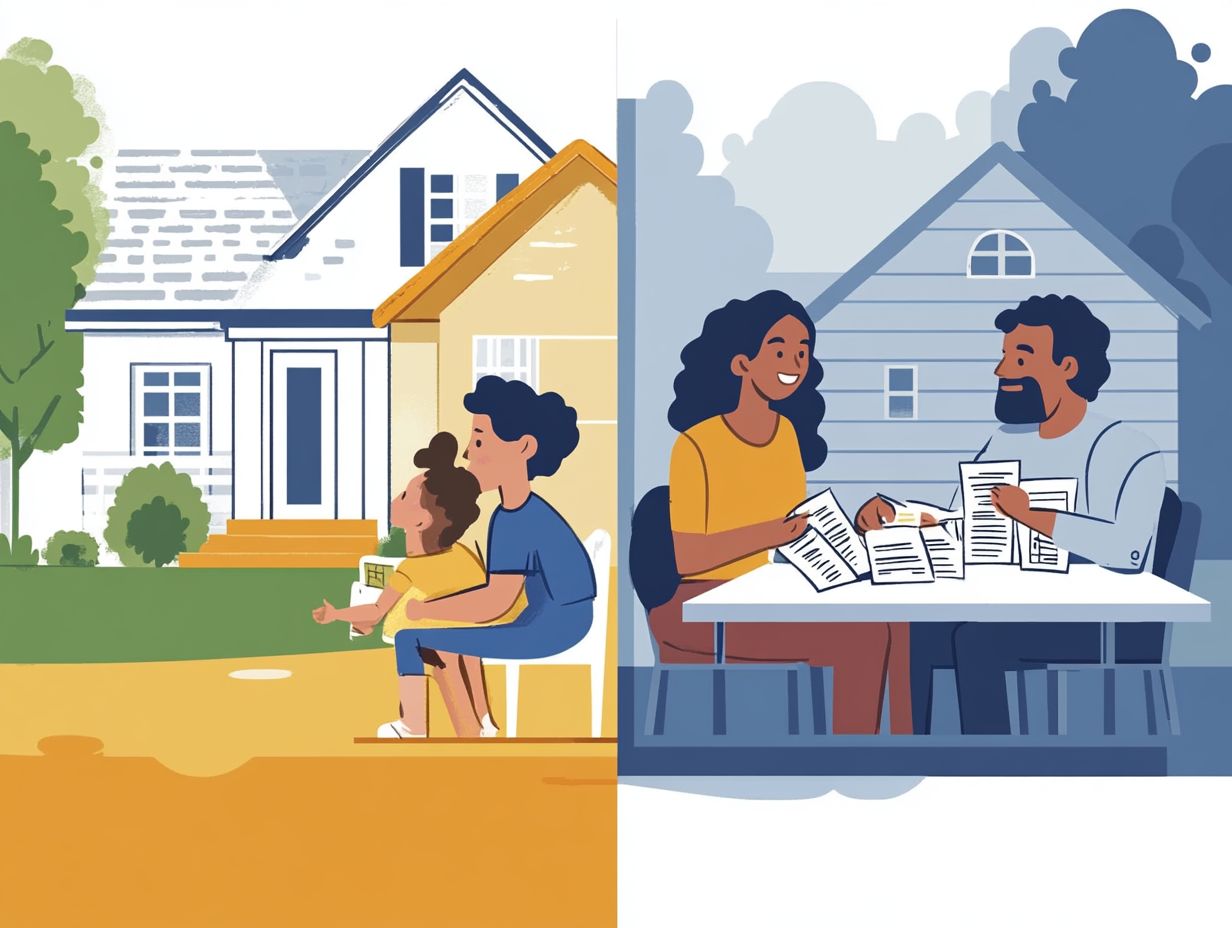The Pros and Cons of Interest-Only Mortgages
Interest-only mortgages can be a double-edged sword for homebuyers. They offer the allure of lower initial payments and enhanced flexibility, yet they also carry potential pitfalls, such as higher overall costs and the risk of negative equity.
This article delves into the essentials of interest-only mortgages, examining both their advantages and disadvantages. It will guide you in determining whether this option aligns with your financial goals. Alternatives worth considering will also be presented, ensuring you make a well-informed decision on your home financing journey.
Contents
- Key Takeaways:
- Understanding Interest-Only Mortgages
- The Pros of Interest-Only Mortgages
- The Cons of Interest-Only Mortgages
- Is an Interest-Only Mortgage Right for You?
- Alternatives to Interest-Only Mortgages
- Frequently Asked Questions
- What are the pros of interest-only mortgages?
- What are the cons of interest-only mortgages?
- Who is a good candidate for an interest-only mortgage?
- Are interest-only mortgages available for all types of properties?
- Do interest-only mortgages have a fixed or variable interest rate?
- What should I consider before choosing an interest-only mortgage?
Key Takeaways:

Interest-only mortgages allow for lower initial payments and flexibility in payment options, making them attractive to some homebuyers. However, they also come with a higher total cost and the potential for negative equity. Consider your financial situation and alternatives before deciding if an interest-only mortgage is right for you.
Understanding Interest-Only Mortgages
Interest-only mortgages are a special type of loan that allows you to pay only the interest for a specified period. This arrangement leads to lower monthly payments compared to conventional loans.
In today’s unpredictable housing market, this financial product can be appealing. Adjustable-rate mortgages can complicate your decision-making process.
It s crucial to grasp the implications of an interest-only mortgage on your cash flow and overall financial strategy.
Definition and Basics
An interest-only mortgage is a loan where you pay only the interest for an initial period, postponing the repayment of the principal until later. This setup allows for lower monthly payments during the interest-only phase, typically lasting five to ten years.
During this time, you may find your cash flow more flexible, allowing you to allocate funds toward other expenses or investments. However, be mindful of the loan’s provisions, as they can lead to significantly higher payments once you transition to the repayment phase.
The effects on long-term equity can be significant. Since you might not be reducing your principal balance during the interest-only period, this can influence your overall financial strategy in ways you might not expect.
The Pros of Interest-Only Mortgages
Interest-only mortgages present various advantages, especially in the early phases. This option allows you, as a mortgage borrower, to benefit from lower payments while maintaining flexibility in your financial planning.
Lower Initial Payments
One standout benefit of interest-only mortgages is the significantly lower initial payments, enhancing your cash flow during the early years of your loan.
This increased cash flow enables you to redirect funds toward other financial priorities, whether that means saving for retirement, investing in stocks, or even giving your home a much-needed makeover.
With lower mortgage payments especially in a fluctuating rate environment you can channel more of your income into areas that promise higher returns over time.
Take advantage of low rates. You ll enjoy lower payments and have the flexibility to build a stronger financial plan, ensuring stability and growth across various facets of your life.
Flexibility in Payment Options

Interest-only mortgages offer the flexibility to customize your payment options, aligning your financial strategies with your unique circumstances.
With this mortgage type, you can pay only the interest for a specified period, helping you manage your cash flow more effectively. You can also make early payments without incurring penalties, a significant advantage in your financial planning.
If your situation evolves, transitioning to a principal repayment schedule is an accessible choice, enabling you to adjust your repayment strategy to fit your changing financial landscape.
This level of adaptability can be particularly beneficial as you look to optimize your mortgage while maintaining control over your budget and financial goals.
Ready to take the next step? Consider your financial goals and see if an interest-only mortgage fits your needs!
The Cons of Interest-Only Mortgages
While Interest-Only Mortgages offer certain advantages, it’s essential for you to weigh the pros and cons of a 15-year mortgage carefully.
You may face higher total costs over time, along with the risk of payment shock when you transition to repayment of the original loan amount.
Being aware of these factors will enable you to make a more informed decision.
Higher Total Cost
One notable drawback of Interest-Only Mortgages is that they may cost you more in the long run, especially if you’re not prepared for future principal repayment.
This financial arrangement can create a misleading sense of affordability, leading you to focus solely on manageable monthly payments while overlooking the looming balloon payment.
Many people find themselves unprepared when it s time to start repaying the principal. As that debt approaches, unexpected expenses or changes in income can heighten the risk of default.
You must understand not only your current financial situation but also the long-term implications of your mortgage decisions. This ensures you have solid strategies in place to navigate potential challenges.
Potential for Negative Equity
You must remain vigilant about the risk of negative equity, particularly in a fluctuating housing market where property appreciation may not align with your loan structure.
If your home’s value decreases or fails to rise as anticipated, you could end up owing more on your mortgage than your property is worth, creating a precarious financial landscape.
This concern escalates in times of economic uncertainty, where market volatility can trigger sudden drops in home values. Understanding the intricacies of property appreciation is essential, as it directly impacts your equity levels.
Without a solid grasp of these dynamics, you could unintentionally jeopardize your financial stability. Thus, making informed decisions becomes absolutely imperative.
Is an Interest-Only Mortgage Right for You?
Deciding if an Interest-Only Mortgage suits your needs requires careful evaluation of several key factors.
Think carefully about your ability to handle future payments, as well as your current debt-to-income ratio, which shows how much of your income goes to paying off debts. Assessing these aspects will help ensure your choice aligns with your financial goals.
Factors to Consider

When considering an Interest-Only Mortgage, it s essential to evaluate factors such as your income, debt-to-income ratio, and overall financial stability to make an informed decision. These elements significantly impact your ability to navigate the complexities of this financial commitment.
A steady income not only equips you to meet monthly payments but also instills confidence in lenders regarding your repayment capability.
A healthy debt-to-income ratio is crucial as it reveals how much of your earnings are already allocated to existing debts, which directly influences your capacity to take on additional financial obligations.
Your overall financial stability, including savings and credit history, reassures both you and the lender that any unforeseen circumstances can be effectively managed, paving the way for your long-term success in handling the mortgage.
Alternatives to Interest-Only Mortgages
If you find yourself hesitant about Interest-Only Mortgages, several great alternatives are available for you to consider.
Options such as:
- Conventional loans
- Fixed-rate mortgages
- Jumbo mortgages
- Home Equity Lines of Credit (HELOCs)
are all at your disposal, allowing you to choose the path that best aligns with your financial goals.
Other Mortgage Options
Other mortgage options include conventional loans and fixed-rate mortgages. They provide stable and predictable repayment structures.
By knowing exactly how much is due each month, you can allocate your funds with confidence. This ensures that you meet other financial commitments without the stress of fluctuating payments.
These financing options often come with fixed interest rates that protect you from market fluctuations. Imagine having the peace of mind that comes with knowing exactly what your mortgage payment will be each month!
When navigating the home financing landscape, choosing reliable arrangements can pave the way for a more secure and sustainable financial future.
Frequently Asked Questions
What are the pros of interest-only mortgages?
Some advantages of interest-only mortgages include lower initial monthly payments, potential tax benefits for investment properties, and flexibility in cash flow for borrowers.
What are the cons of interest-only mortgages?
Some potential drawbacks include higher overall interest costs and the risk of not building equity in the property. Additionally, there’s a possibility of rising monthly payments after the interest-only period ends.
Who is a good candidate for an interest-only mortgage?
Interest-only mortgages may suit borrowers with fluctuating income or those planning to sell the property within a few years. They are also appealing for real estate investors seeking tax benefits and cash flow flexibility.
Are interest-only mortgages available for all types of properties?
Interest-only mortgages are typically available for primary residences, second homes, and investment properties. However, eligibility requirements may vary. Discuss your specific situation with a mortgage lender to explore your options.
Do interest-only mortgages have a fixed or variable interest rate?
Interest-only mortgages can have either a fixed or variable interest rate, depending on the lender and loan terms. Carefully consider and compare the interest rates and terms before making a decision.
What should I consider before choosing an interest-only mortgage?
Before deciding on an interest-only mortgage, consider your financial goals, risk tolerance, and long-term plans for the property. Understanding the terms and potential risks is crucial. Consult with a financial advisor or mortgage lender for personalized advice.
Thinking of an interest-only mortgage? Reach out to a mortgage lender today to explore your options!






